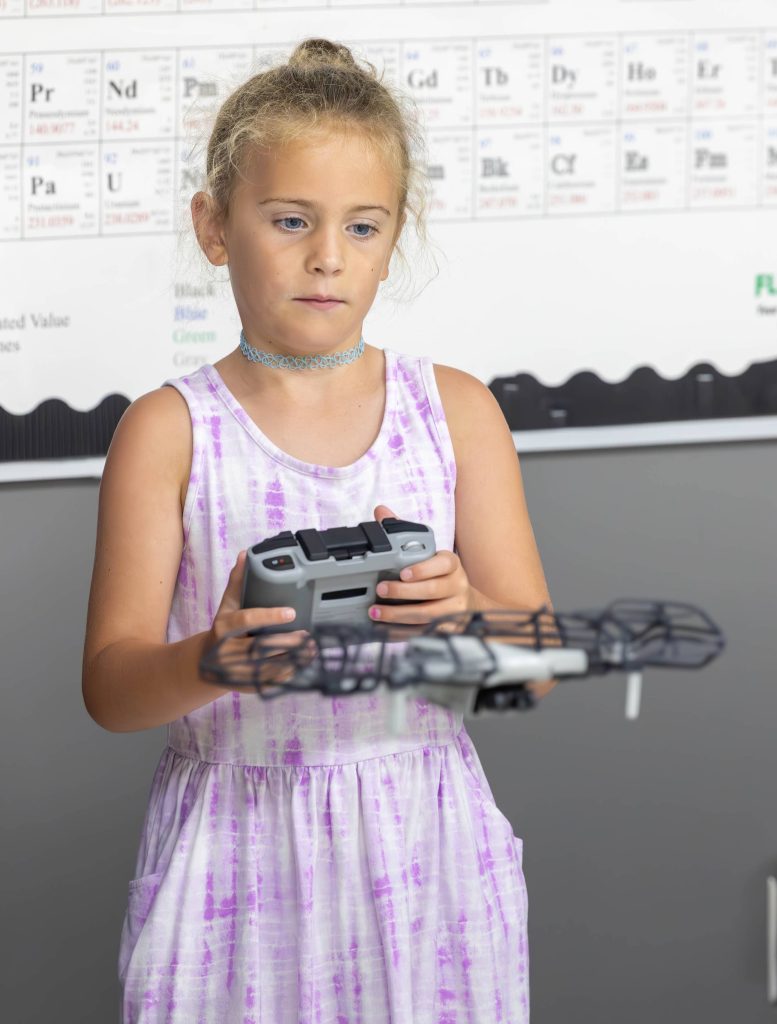
At RCS, our vision is to spiritually develop our students to impact the community and the world for Christ. We want our students to go into every man’s world (Mark 16:15). With the Aerospace/Defense industry being the second largest sector in Oklahoma, part of our vision is also to prepare them academically so they are prepared to go into whatever field God has called them!
RCS Aviation provides a foundation in aeronautics with historical perspectives, from the early flying machines to modern space exploration. Students learn how both aircraft and drones are constructed, operated, maintained, and the rules that govern them. Human factors, safety, and government entities like the FAA and NTSB are discussed.
As part of the curriculum, students prepare to pass the FAA Private Pilot Knowledge Exam and the FAA Part 107 Drone Pilot Exam. Students can ultimately certify as FAA commercial drone pilots with the ability to be paid for their services. During the school year, students engage in FlightLab activities applying skills learned in the classroom to real-world flight simulations. Students can then transfer their knowledge gained from simulator training to actual aircraft flight training and pilot certification.
Where can this Lead?
Similar to robotics and STEAM classes, aviation is for everyone, especially those who enjoy airplanes and space exploration. The curriculum lays the foundation to better prepare students for the future in aviation and other related careers they will pursue. Any student who pursues pilot certification will need further aircraft training outside of RCS.
Building a resume is difficult for younger students with little experience. Our curriculum gives these students the ability to add the FAA 107 Drone Pilot Certification to their resume. Once certified, students as young as age 16 can work as drone pilots. Firefighting, law enforcement, and real estate are just a few examples of industries that utilize drones. Our curriculum transfers to other career fields.
Who is James Cox?
James Cox graduated from OSU’s aviation program earning a Bachelor of Science. Mr. Cox flew various aircraft and has been certified as a flight instructor since 1996. During his flying career, James logged over 11,000 flight hours in piston, turbo-prop, and jet aircraft, mostly as pilot-in-command. Before leaving the airlines, James earned a Boeing 737 Captain certification and started his own flight simulator business, Aces Alley. His business was later sold to the Museum of Space History to continue James’s vision of educating youth about the joys of flight using STEM initiatives.
From a professional pilot, to a business owner, James went back to his roots of teaching. After working with Owasso Public Schools as a high school science and aviation teacher, Mr. Cox was recruited to start the RCS aviation program and continue his teaching legacy.
From humble beginnings when aviation shared a corner in Mr. Cox’s science classroom, to a dedicated RCS FlightLab within a year’s time, RCS Aviation has grown to rank within the top high school aviation programs in the nation. This is a testament to God’s faithfulness.
Mr. Cox’s favorite Bible verse is Jeremiah 29:11 “For I know the plans I have for you,” declares the Lord, “plans to prosper you and not to harm you, plans to give you hope and a future.”
Why is Aviation Curriculum Important?
“…developing both critical thinking and decision-making skills involves a multifaceted approach that includes identifying problems, gathering information, analyzing data, considering alternative perspectives, and making informed choices. It also entails reflecting on the process and outcomes, and continuously learning and improving…”
This is precisely what students must do during a FlightLab lesson. Maintaining control of an aircraft from a pilot or air traffic controller perspective is not an easy task. Students must gather information, analyze it, apply it, and have a back up plan in case their decisions are wrong, all at once.
As students improve with practice, so does their overall brain development. Situational awareness strengthens while balancing and prioritizing tasks become easier. Overwhelmed stimulation and tunnel vision begin to disappear. Students can process information quicker and think ahead. Ultimately, they enhance decision-making and critical thinking skills which transfer over into other studies and everyday life.
Aviation class is not so much about teaching kids how to fly, but providing an avenue for their thought process to excel. Every student regardless of the profession they pursue in the future, benefit from the skills attained during RCS Aviation class.


